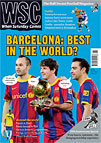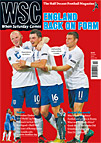 Reflections on life as a Premier League footballer
Reflections on life as a Premier League footballer
by Louis Saha
Vision Sports, £14.99
Reviewed by Simon Hart
From WSC 308 October 2012
It was in the wake of the darkest hour of his life in football, when injury robbed him of the chance to play in the 2008 Champions League final, that Louis Saha began writing down the thoughts filling his troubled mind. Saha wept in his wife’s arms in the Luzhniki Stadium that night and would soon leave Manchester United for Everton, yet his writing became a crutch and eventually led to a book that is quite unlike your usual footballer’s offering.
“Eclectic” is how Saha describes his approach in the preface to Thinking Inside The Box, in which he combines memoir with musings on a range of football-related topics: media, money, racism, fans, music. And eclectic is a fitting word for a book that does not list medals won or goals scored but instead references Sir Trevor McDonald, Dominique Strauss-Kahn and the Leveson Inquiry, quotes Sean Penn, questions the French education system, praises the Bakewell tart, and cites statistics about CCTV cameras and anorexia sufferers.
It starts with Saha’s wry observation that his name means health in Arabic. “Me: plagued by injury,” he notes. It is certainly ironic that a player who acquired a reputation as injury-prone, even work-shy, should provide two poignant passages on the pain of missing matches. As well as the 2008 Champions League final, when his asthma meant he could not take the painkilling injection administered to Nemanja Vidic, he recalls his nausea after the booking that ruled him out of the 2006 World Cup final, adding lyrically: “My throbbing head was trapped in the referee’s pocket.”
Saha, with his evident love of the “paradise” of English football, denudes any notions about himself “not caring”. He does the same for the one-dimensional image of the footballer, writing with empathy about team-mates yet acknowledging their weaknesses. Wayne Rooney is capable of smashing a mobile phone in anger on the team bus yet also of answering every question in a quiz. Nicolas Anelka, a contemporary at the Clairefontaine national academy, had “tenacity, tinged with a touch of madness”. There is even understanding for young players who use prostitutes rather than risk kiss-and-tells.
The book’s French title, Du Quartier Aux Etoiles – “From the streets to the stars” is a rough translation – evokes his journey from a poor district of Paris under the guiding hand of his disciplinarian father, an immigrant from Guadeloupe, but while retelling his rise Saha provides a broader scope by including the thoughts of old team-mates like Patrice Evra, Thierry Henry, Zinédine Zidane and Phil Neville, and his manager at Old Trafford, Alex Ferguson.
Translated from French, the book has an idiosyncratic style – “bro” and “lol” crop up a lot while a chapter on money introduces an imagined “Mam’zelle Starfucker” and “Mr Bling”. Saha’s approach to money betrays an ambivalence – he lists his expensive cars yet worries his children are spoiled. Meanwhile, he gives his wife Aurélie a chapter to offer a WAG’s perspective, laments the demise of traditional values and yet declares that total honesty is the wrong approach with a woman “because what you say goes in one ear and comes out through her mouth, with added ammo”.
This ambivalence is a virtue of a book that asks questions while seeking no easy answers. It is not something you heard every week at Goodison Park, but full marks to Saha for trying.



